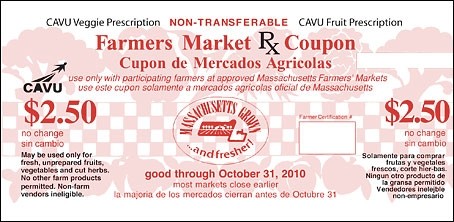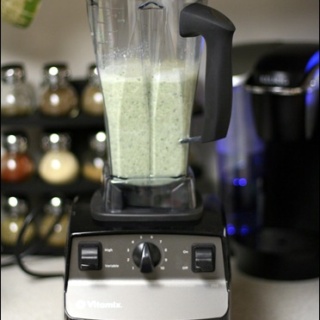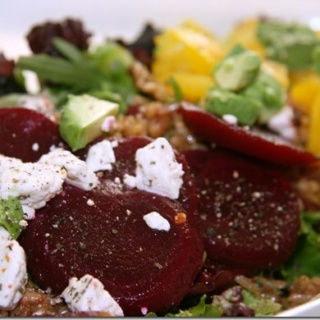Morning, friends, and TGIF! I thought today it would be fun to mix things up and share a little reading for you all in hopes of getting a good discussion going.
When I was at my parent’s house last weekend, my mom gave me a few article clippings from the Washington Post that she thought I would find interesting. One of them was an article about an amazing new program in which low income DC area residents have started receiving prescriptions for — get this — fresh fruit and vegetables!

Want to save this post?
Enter your email below and get it sent straight to your inbox. Plus, I'll send you great content every week!
Example of a food coupon (source)
Unity Health Care Upper Cardozo clinic has been providing the prescriptions through their weekly program “We Can,” in which low income families that struggle with obesity or chronic disease can come for cooking classes, exercise classes, and information on developing a healthier lifestyle. The problem was that just educating the low income families about eating more fruits and vegetables and cooking more at home didn’t really help if they couldn’t afford the fresh produce on their own, so on June 6, the clinic began writing fruit and vegetable prescriptions. The program is starting small with hopes of expanding later — for now, 35 families will receive $1 per family member per day ($112 per month for a family of 4) to spend at their choice of five different DC area farmer’s markets.
The produce prescription program, which was originally created by a nonprofit called Wholesome Wave, has been implemented in other cities previously and has shown success in improving access to and intake of fruit and vegetables among the low income prescribers and their families.
Working in a hospital this summer for my dietetic internship has convinced me even more of the need for preventative (vs. just reactive) programs combatting obesity and chronic diseases. Since I’m getting a Masters of Public Health from UNC, in addition to all the normal RD science coursework, I also took a number of classes on creating prevention programs to combat obesity and chronic disease on the community level, and I love the sound of this new (to DC) program. Not only does it improve health education and fruit and vegetable access, but the hope is that giving fruits and vegetables a literally medical endorsement will encourage the families to make real changes in the way they eat and shop (and think) about health.
So — what do you all think? I’d love to hear your thoughts on this. Do you think a more medical endorsement of healthy eating like this will help to finally drive the point home that medicine can be food instead of just pills? Do you think this could ever be adopted in a hospital setting? I know the hospital where I’m interning this summer could use it, with most of its patients low income!
Here’s a link to the full Washington Post article, if you’re interested!






